self-defense
How Teen Girls in Mumbai Are Learning to Stand Tall
As Nausheen, a 14-year-old Mumbai schoolgirl, demonstrates the kicks and punches she has newly learned, there is a perceptible change in her body language. From a shy, giggly teenager, she turns into a budding supergirl: somehow she seems taller, her stance straighter and her voice louder.
“When I practice these moves, I feel a surge of power inside me,” she says. “I feel like I don’t have any fear.”
Nausheen has been learning martial arts — among other concepts such as consent and communication — at the free biweekly workshops conducted by the nonprofit MukkaMaar at her government school in a crowded Mumbai suburb. “I have learned to be strong and to face people with confidence,” she says, “whether it is my parents at home or strangers outside.”
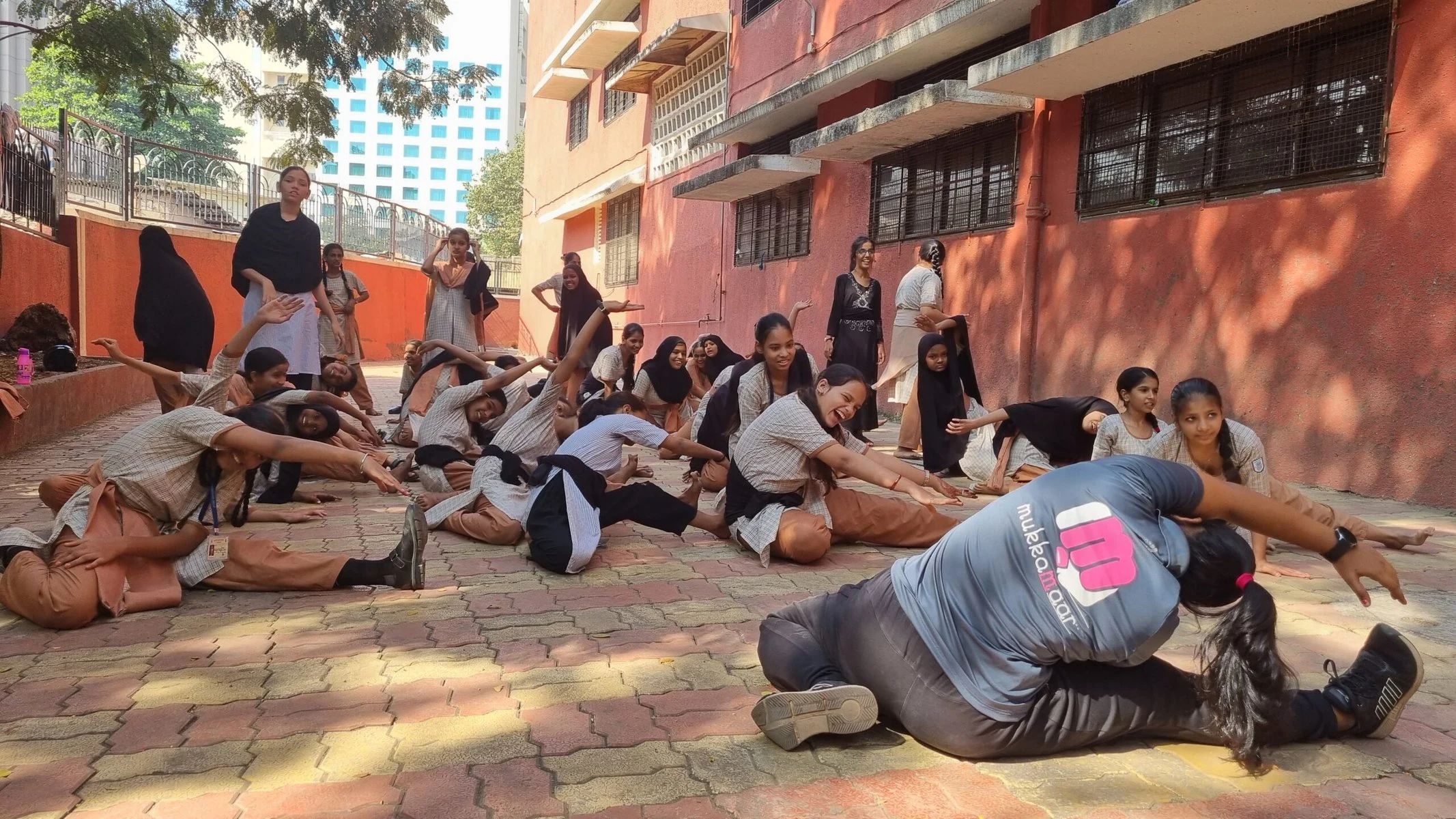 MukkaMaar partners with 56 government schools in Mumbai. Courtesy of MukkaMaar
MukkaMaar partners with 56 government schools in Mumbai. Courtesy of MukkaMaar
Contrast this with what MukkaMaar’s founder Ishita Sharma remembers from a casual conversation with a group of middle-school girls a few years ago. When asked what they would do if someone attacked them on the streets, they unanimously responded: Shout bachao bachao! (help).
“They didn’t even think about it,” Sharma says. “It was a natural response to expect someone else to come and save them, because that is what they have been taught, what they have seen in movies.”
It was with the basic aim to shift this control from the outsider to the individual that Sharma started MukkaMaar — roughly translating to “throw a punch” — as an empowerment program for adolescent girls. “Women need to take responsibility for their own safety and not succumb to the ‘What will the poor woman do?’ narrative,” she explains.
Courtesy of MukkaMaar
At MukkaMaar’s free workshops, girls learn martial arts and build confidence. They also learn about communication and consent.
Sharma began in 2016 with four girls on a public beach and the conviction that teaching self-defense was the way to empower them. Over seven years and 3,000 girls later, she has learned that along with martial arts, there is also a need for a change in fundamental beliefs and attitudes. She shares examples of how these girls are schooled to be “good daughters” who grow up to be “good wives” (for instance, to blindly marry the man chosen by their parents, as opposed to committing to a “love marriage”). She explains that there is a need to teach them to question and debate at home, negotiate for their rights, develop and assert their own personalities, and so on.
MukkaMaar now partners with 56 government schools in Mumbai, where martial arts teachers are trained to listen to and counsel the girls, who open up with their own stories. These trainers are young men and women in their late teens and 20s, who usually work in teams of two. At 19, national level boxing champion Aradhana Gaund is not much older than the girls she trains. “They treat me like their friend, and I laugh and cry with them,” she says.
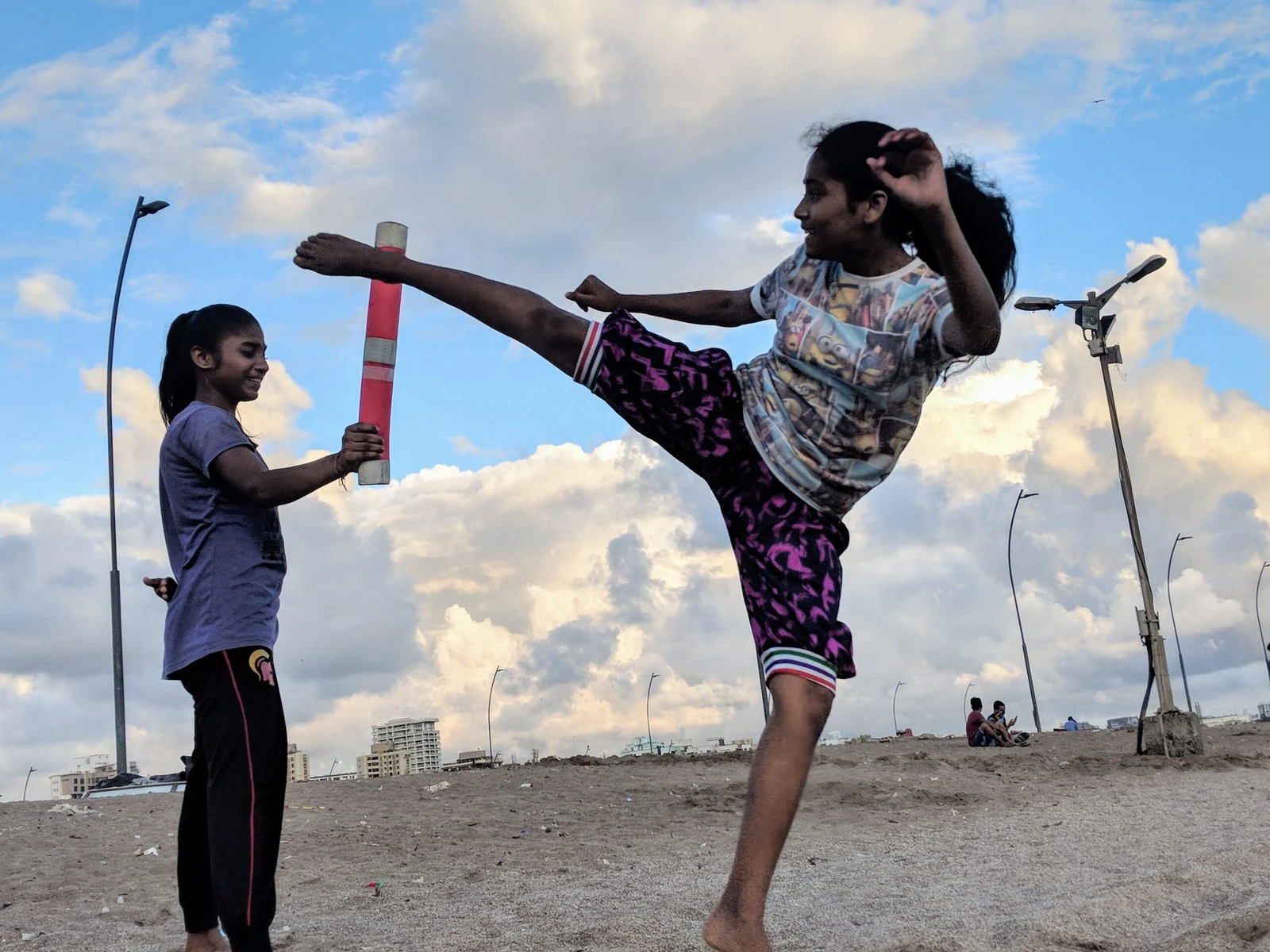 In the workshops, girls learn that violence is not a knee-jerk response, but a last resort. Courtesy of MukkaMaar
In the workshops, girls learn that violence is not a knee-jerk response, but a last resort. Courtesy of MukkaMaar
Elsa Marie D’Silva, founder of Red Dot Foundation, a nonprofit working to create safe spaces for women, says it can be intimidating for young women to stand up against harassment, and so “it is important to show them how they can speak out together, along with their friends or as a group, to call out bullies.” Indeed, this is one of the things that gives Gaund the most satisfaction: seeing how these classes have taught the girls to band together and support one another.
According to the Global Gender Gap Report 2023, India ranks a dismal 127 out of 146 countries, based on indices such as access to education, economic opportunities and health. What is even more concerning is the unceasing, systemic violence against women that takes several forms including intimate partner violence, rape and assault, dowry deaths, acid attacks and everyday street harassment.
Crushed by negative news?
Sign up for the Reasons to be Cheerful newsletter.
[contact-form-7]
Women are told from childhood to keep their heads down and take these things in stride, that to react would be futile and even dangerous. They internalize this to such an extent that they suffer harassment silently, which in turn encourages their abusers to carry on with impudence. This is where MukkaMaar has been making a small but significant difference.
Iqra, 13, says, “Earlier, I used to move away quietly when a man touched or groped me in the [public] bus. But now, I just make my voice loud and strong like I have been taught, and tell them to stop it.” At this, her friend Fatima chimes in, “Now we feel like we can also walk and talk like the boys.”
Courtesy of MukkaMaar
Ishita Sharma started MukkaMaar with the goal of changing girls’ “natural response to expect someone else to come and save them” — and showing them that they can be the ones in control.
But they have both also been taught that violence is not a knee-jerk response, but a last resort. “If we fight, we will also get hurt, but we can speak up,” Iqra declares with the wisdom of one far older.
And speak up they do, at every chance. “At my cousin’s wedding, a boy I don’t know started teasing me,” Fatima recalls. “When I shouted at him, his mother intervened and scolded him. Earlier I used to feel nervous in such situations, I used to think, ‘I am a small girl, what can I do?’”
As Sharma describes it, “We are not telling them that violence is the answer, but that violence should not be tolerated.”
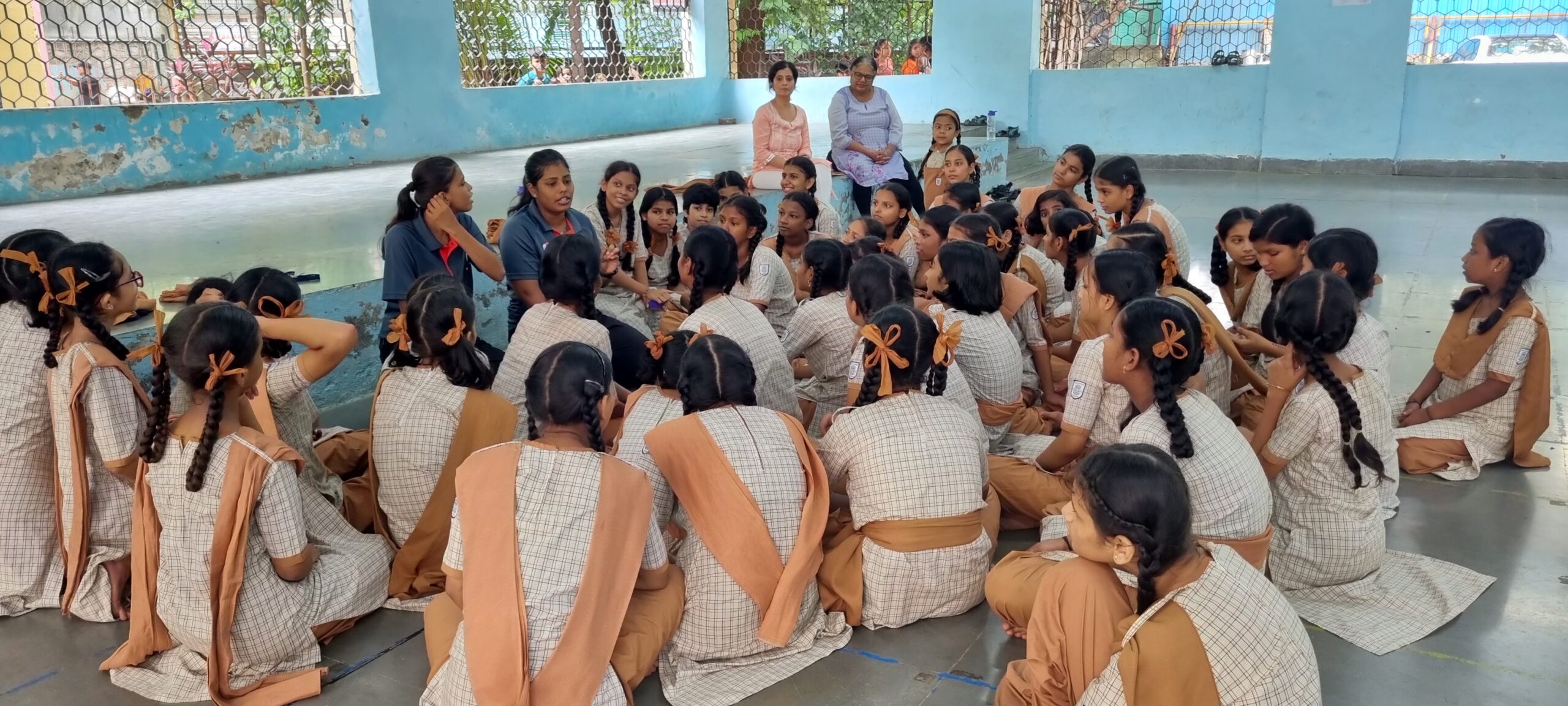 “We train them to vocalize their feelings, to open up their shoulders and lift up their chins,” explains one of MukkaMaar’s trainers. Courtesy of MukkaMaar
“We train them to vocalize their feelings, to open up their shoulders and lift up their chins,” explains one of MukkaMaar’s trainers. Courtesy of MukkaMaar
The MukkaMaar website states, “It is necessary to recognize that violence includes microaggressions, discrimination, threats, and loss of opportunity as much as assault.” The training, therefore, does not just cover self-defense but also building physical fitness and emotional strength, as well as boosting (and often instilling) self-confidence.
Senior training fellow, Bhishma Mallah, 26, who has been with MukkaMaar for over four years, says that the girls begin with so many barriers, like shame and fear, that even to get them to exercise in front of others or to express themselves verbally is a challenge. “We train them to vocalize their feelings, to open up their shoulders and lift up their chins. We have to tell them repeatedly to forget about adjusting their dupatta [traditional scarf used to cover head or shoulders] and focus on the activity.”
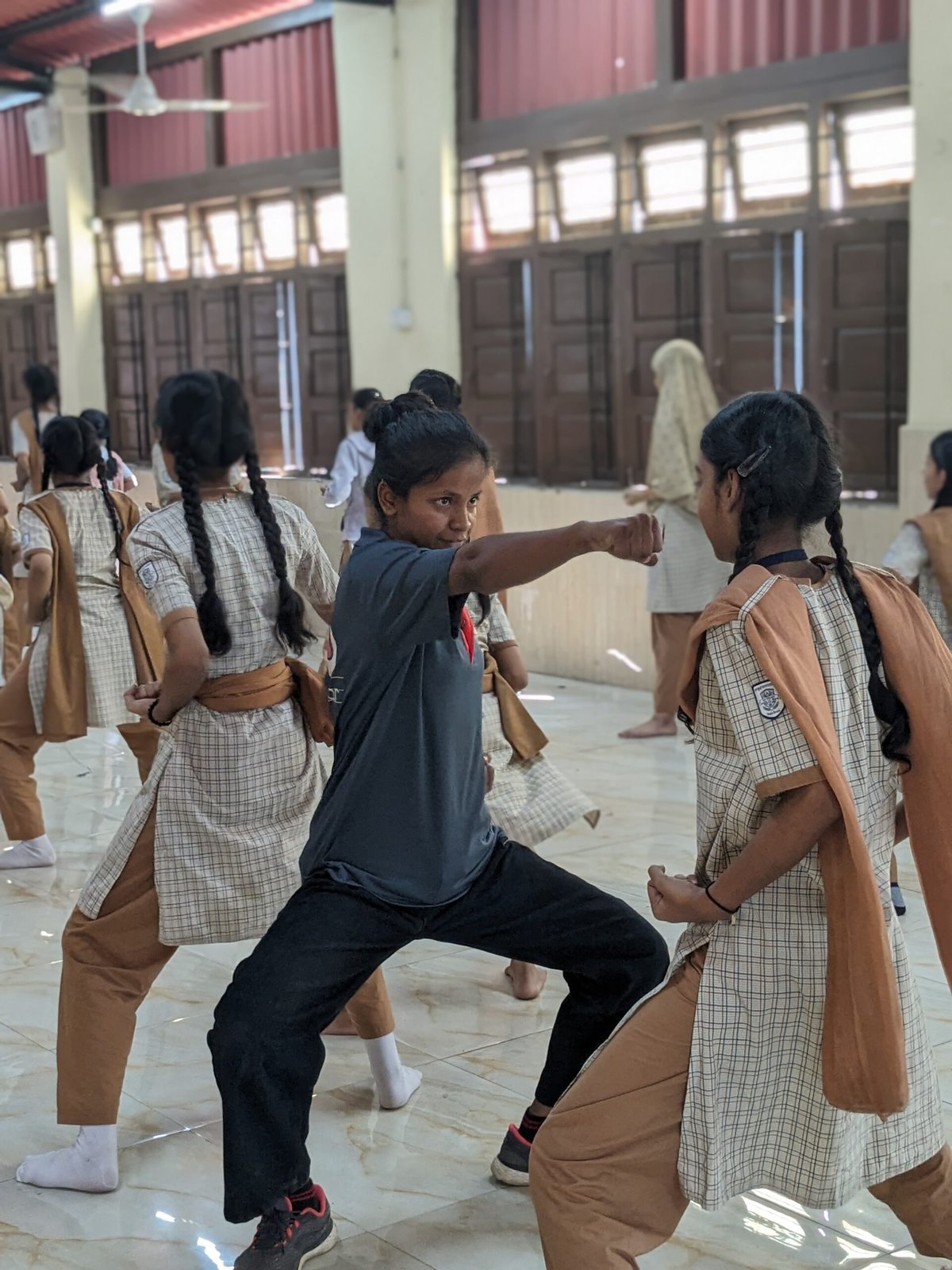 Even during workshops, the girls ask for permission before making physical contact. Courtesy of MukkaMaar
Even during workshops, the girls ask for permission before making physical contact. Courtesy of MukkaMaar
One of the many ways in which the trainers chip away at the diffidence of these young girls is by making them chant “I am important” even as they practice their moves. Or asking them to imagine how a dog growls, and to channel that aggression in their kicks and punches.
Each hour-long session includes 20 minutes of conversations and counseling, with the remaining time devoted to physical training. “We teach them about concepts like boundaries, consent and safe touch. Even during lessons, they have to take permission from their partner before any physical contact,” explains Mallah.
Sharma admits it took her a couple of years to realize that for a girl to build agency, there is a lot of familial and social conditioning that needs to be undone. “There is no point in teaching them martial arts alone, with its focus on discipline and technique — because unless we teach them critical thinking, it is all pointless, and forgotten the minute they step out of the classroom,” says Sharma.
Red Dot Foundation founder D’Silva adds a word of caution: “It’s not enough to just empower the girls to speak up, it is also the responsibility of adults to listen to them when they do. If their parents or teachers don’t take them seriously, then the child will quickly learn not to tell anyone — because there is the added fear of having their personal freedom curtailed under the guise of protecting them or saving the family honor.”
A change in the larger ecosystem may take a long time, but it is clear that something is shifting within these girls. While one cohort confronted a cop making a video call in front of them and challenged him to prove he was not taking their photos without permission, another group of girls gathered the courage to file a police complaint against their physical education teacher who had been harassing them. For others, it has meant something as seemingly trivial as talking back to their fathers and challenging gendered rules and restrictions.
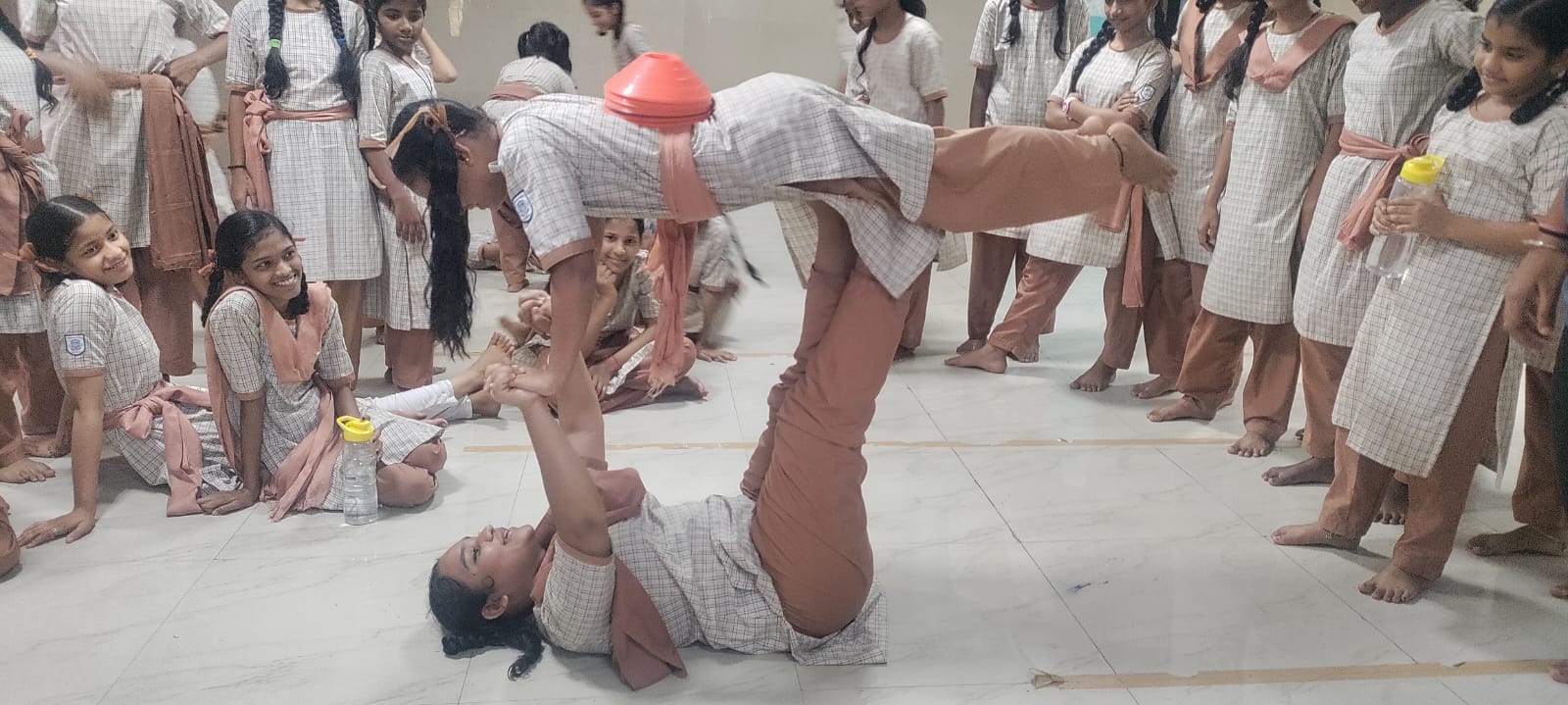 “I have learned to be strong and to face people with confidence,” one MukkaMaar student says, “whether it is my parents at home or strangers outside.” Courtesy of MukkaMaar
“I have learned to be strong and to face people with confidence,” one MukkaMaar student says, “whether it is my parents at home or strangers outside.” Courtesy of MukkaMaar
These may seem like small incidents, but for these young girls in Mumbai, the freedom to think independently and challenge those around them has been life-changing.
In the short run, Sharma says MukkaMaar wants to focus on fewer places and create retention, rather than spread the program thin all over the city. The future is digital for MukkaMaar alumni, with a chatbot that helps the girls have a two-way conversation about self-defense techniques, physical fitness, understanding of different types of gender violence and soft skills like communication and negotiation. This keeps them connected to the program, and to everything they learned in it, even after they leave.
The post How Teen Girls in Mumbai Are Learning to Stand Tall appeared first on Reasons to be Cheerful.